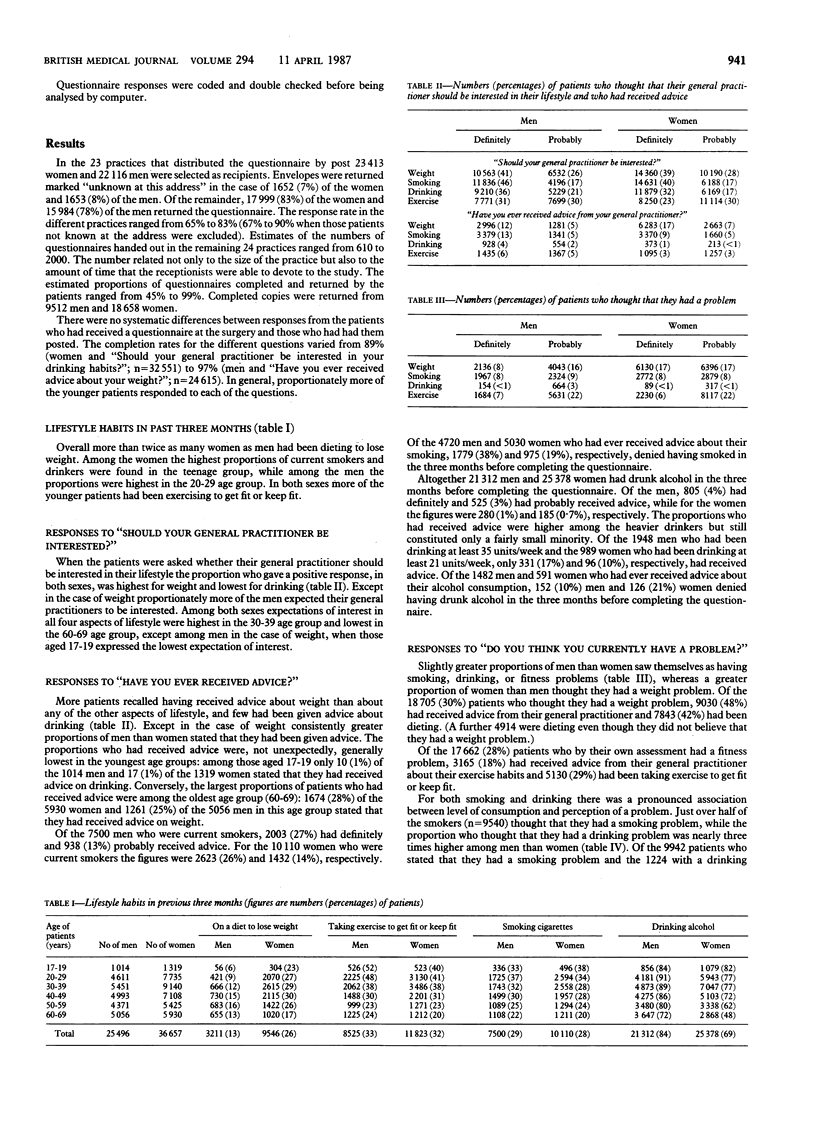Abstract
The health survey questionnaire was used to collect information about cigarette smoking, alcohol consumption, physical exercise, and dieting and weight. Completed questionnaires were received from 25,496 men and 36,657 women registered with 47 group practices in England and Scotland. The proportions of respondents who stated that they had a problem ranged from 1% (women and drinking, n = 406) to 34% (women and weight, n = 12,526). Between 49% (women and drinking, n = 18,048) and 67% (men (n = 17,095) and women (n = 24,550) and weight) thought that their general practitioners should be interested in their lifestyle. The proportions who could recall having received relevant advice ranged from 2% (women and drinking, n = 591) to 24% (women and weight, n = 8946). Advice about smoking had been given to 4055 (40%) of the women and 2941 (39%) of the men who smoked. Only 96 (10%) of the 989 women and 331 (17%) of the 1948 men who drank excessively could recall having received advice about alcohol consumption. These results suggest that patients are concerned about their lifestyle, that most would welcome relevant counselling, and that doctors should become more concerned with prevention of this kind.
Full text
PDF


Selected References
These references are in PubMed. This may not be the complete list of references from this article.
- Jamrozik K., Fowler G., Vessey M., Wald N. Placebo controlled trial of nicotine chewing gum in general practice. Br Med J (Clin Res Ed) 1984 Sep 29;289(6448):794–797. doi: 10.1136/bmj.289.6448.794. [DOI] [PMC free article] [PubMed] [Google Scholar]
- Richmond R., Webster I. Evaluation of general practitioners' use of a smoking intervention programme. Int J Epidemiol. 1985 Sep;14(3):396–401. doi: 10.1093/ije/14.3.396. [DOI] [PubMed] [Google Scholar]
- Riecken H. W., Ravich R. Informed consent to biomedical research in Veterans Administration Hospitals. JAMA. 1982 Jul 16;248(3):344–348. [PubMed] [Google Scholar]
- Russell M. A., Wilson C., Taylor C., Baker C. D. Effect of general practitioners' advice against smoking. Br Med J. 1979 Jul 28;2(6184):231–235. doi: 10.1136/bmj.2.6184.231. [DOI] [PMC free article] [PubMed] [Google Scholar]
- Sobal J., Valente C. M., Muncie H. L., Jr, Levine D. M., Deforge B. R. Physicians' beliefs about the importance of 25 health promoting behaviors. Am J Public Health. 1985 Dec;75(12):1427–1428. doi: 10.2105/ajph.75.12.1427. [DOI] [PMC free article] [PubMed] [Google Scholar]
- Wallace P. G., Haines A. P. General practitioner and health promotion: what patients think. Br Med J (Clin Res Ed) 1984 Sep 1;289(6444):534–536. doi: 10.1136/bmj.289.6444.534. [DOI] [PMC free article] [PubMed] [Google Scholar]
- Weinberg A., Andrus P. L. Continuing medical education: does it address prevention? J Community Health. 1982 Spring;7(3):211–214. doi: 10.1007/BF01325516. [DOI] [PubMed] [Google Scholar]



